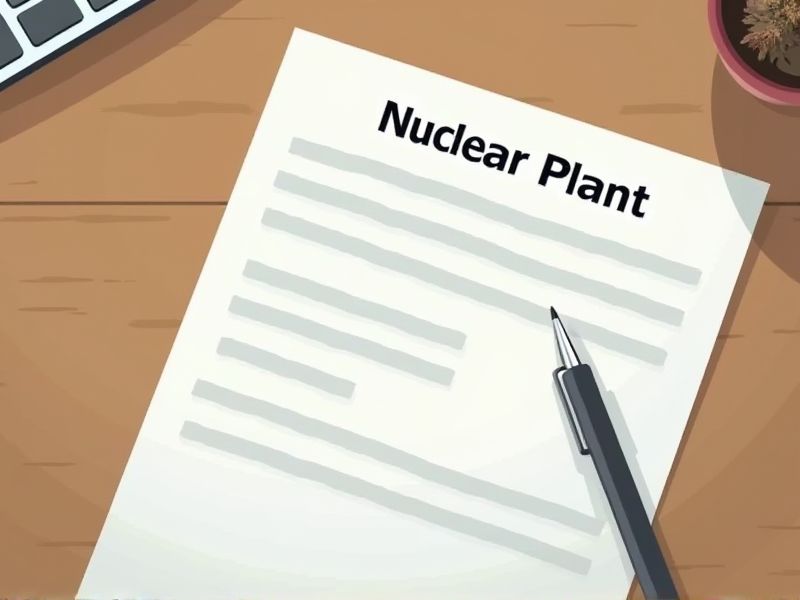
Nuclear plant operators oversee complex systems that require precise and informed operation to ensure safety and efficiency. Certifications validate an operator's knowledge and skills, mitigating risks associated with hazardous materials and sophisticated technologies. Regulatory bodies mandate certifications to maintain high safety standards and ensure compliance with international guidelines. Essential certifications for a Nuclear Plant Operator include the following.
NRC Reactor Operator License
The NRC Reactor Operator License is required to ensure operators meet the stringent safety and competence standards essential for handling nuclear reactors. Without a license, operators may lack the necessary training, increasing the risk of accidents due to human error. This license provides a structured assessment of an individual's ability to respond to anomalies and maintain regulatory compliance. Licensing enhances public trust in nuclear energy systems by demonstrating commitment to safety and accountability.
NRC Senior Reactor Operator License
The NRC Senior Reactor Operator License ensures that operators have a comprehensive understanding of nuclear reactor systems, which is critical for maintaining safe operations. This license verifies that operators can make informed decisions during normal and emergency conditions, reducing the risk of accidents. Regulatory requirements mandate this certification to align with safety standards and protocols established by the Nuclear Regulatory Commission. Ensuring operators are licensed supports public trust and regulatory compliance, reinforcing the plant's operational integrity.
Basic Radiological Protection Certification
Basic Radiological Protection Certification is essential because it ensures nuclear plant operators understand how to limit exposure to ionizing radiation, thereby reducing health risks. This certification equips them with the knowledge to implement safety procedures that protect both the workforce and the environment from radiological hazards. Regulatory bodies mandate such certifications to comply with statutory safety standards and prevent potential legal liabilities. Operators with this training can efficiently respond to radiological emergencies, minimizing the impact of unforeseen incidents.
Advanced Radiation Safety Certification
A nuclear plant operator must possess Advanced Radiation Safety Certification to ensure proper handling and control of hazardous materials, reducing the risk of radiation exposure to personnel and the environment. Training in advanced safety protocols helps operators detect and respond to potential radiation leaks or incidents, preventing catastrophic fallout. This certification ensures operators are up-to-date with evolving safety regulations and technological advancements, maintaining industry standards. Lastly, it builds public trust in nuclear energy by demonstrating the industry's commitment to safety and transparency.
Emergency Response Certification
Nuclear plants pose significant risks, and Emergency Response Certification helps ensure operators can effectively manage potential incidents. Trained operators are essential to minimize the impact of accidents and protect public safety. Certification provides operators with the skills to implement safety protocols swiftly during emergency situations. Regulatory bodies mandate such certifications as part of compliance with international nuclear safety standards.
OSHA 30-Hour General Industry Certification
The OSHA 30-Hour General Industry Certification helps equip nuclear plant operators with essential safety knowledge, reducing workplace hazards. This certification cultivates a comprehensive understanding of regulatory standards, ensuring adherence to safety protocols. Enhanced competency from training translates into minimizing accidents and operational disruptions. Regulatory bodies often look for certified individuals to maintain a culture of safety and compliance, which is crucial in nuclear settings.
Hazardous Materials Operations Certification
Nuclear plant operators must have a Hazardous Materials Operations Certification to ensure they can safely handle and manage radioactive substances, minimizing risk to personnel and the environment. This certification provides operators with essential knowledge to identify and respond to chemical hazards, crucial in preventing accidents. With the potential exposure to various hazardous materials in a nuclear plant, the certification equips operators with the skills to implement effective safety protocols. Meeting regulatory standards and maintaining compliance ensures the plant operates safely and avoids legal liabilities.
Industrial Maintenance Certification
The complexity and scale of nuclear plants demand highly skilled operators, and industrial maintenance certification provides essential expertise for maintaining operational integrity. Regulatory bodies mandate strict compliance with safety standards in the nuclear industry, and certified operators meet these criteria, minimizing risks of operational failures. Industrial maintenance certification ensures continuous education and proficiency, which directly correlates with sustained plant efficiency and safety. The certification process enhances an operator's ability to diagnose and resolve technical issues swiftly, reducing downtime and potential hazards.
Non-Destructive Testing Certification
Non-destructive testing (NDT) certification ensures that nuclear plant operators possess the technical expertise required to identify structural flaws without causing damage to the plant's components, maintaining operational integrity. By certifying operators in NDT techniques, the likelihood of detecting potential weaknesses early, such as material fatigue or corrosion, increases significantly, reducing the risk of catastrophic failures. Given the sensitive nature of nuclear materials, precise and reliable assessment methods are crucial to prevent any breach in safety protocols and to ensure public safety. Certified testing practices help comply with stringent regulatory frameworks governing nuclear facilities, thereby reducing legal and financial liabilities for the operators.
Nuclear Safety Professional Certification
Nuclear Safety Professional Certification ensures that a nuclear plant operator has acquired comprehensive knowledge and skills necessary for the safe management of nuclear facilities. It provides a standardized benchmark that prevents human errors and reduces the risk of operational mishaps. Regulatory bodies and government agencies often require such certification to comply with safety laws and regulations. Certified operators demonstrate a commitment to adhering to best practices, which positively impacts the plant's safety culture and public trust.
Summary
With additional certifications, you enhance your expertise and credibility as a Nuclear Plant Operator, leading to increased job opportunities and potential career advancement. This specialized training can result in improved operational performance and a safer working environment. Your advanced knowledge helps in mitigating risks and addressing potential plant issues more effectively. As a result, your role becomes pivotal in ensuring compliance with regulatory standards and maintaining public trust.
